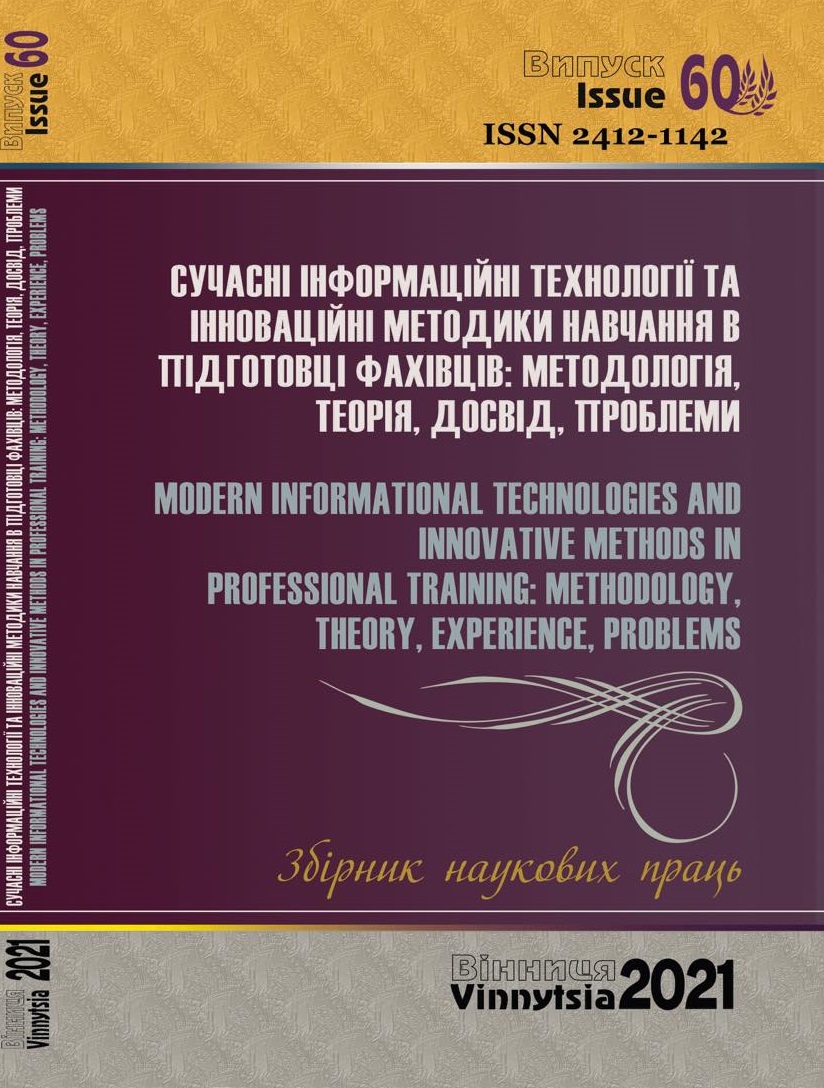PROFESSIONAL SELF-DEVELOPMENT OF A FUTURE TEACHER: HUTTAGOGICAL APPROACH
DOI:
https://doi.org/10.31652/2412-1142-2021-60-315-325Keywords:
professional self-development; future teachers; methodological approaches; hutagogics; hutagogic approachAbstract
The article considers some methodological approaches, including hutagogic. These approaches
are the basis for the formation of readiness of future teachers for professional self-development. The article
considers approaches: acmeological, anthropocentric, activity, competence, personal, synergetic. The
article describes a new approach - hutagogic; named its features. Features of the hutagogic approach: it
combines the best innovative practices of self-education, uses effective methods of self-development; man
begins to play a new role of manager of his knowledge. Hutagogics focuses on the conscious involvement
of each individual in the learning process. Hutagogics focuses on drawing the attention of the pedagogical
society to the search for new effective means of education. Hutagogy helps to prepare a person. It helps to
adapt to modern conditions. Hutagogy involves updating human knowledge. This knowledge should help
to adapt to new conditions. The hutagogic approach helps the diverse development, self-development of
the individual. The hutagogic approach develops the worldview, as well as develops moral and aesthetic
qualities. The article outlines the basic principles of hutagogics: knowing how to learn is a key skill;
teachers are more focused on the learning process than on the content of education; training goes beyond a
specific discipline; the student chooses the content and direction of study. It is proved that the use of the
author’s scientific and methodological system of prospective teacher’s training for continuous professional
self-development and technologies of formation of readiness of prospective teacher for continuous
professional self-development assist to personal and professional growth of prospective teachers, value
comprehension of necessity of purposeful continuous professional self-development; integrative and
theoretical training, increasing level of received, professionally directed knowledge; practical operating
training, formation of practical skills and abilities for professional self-development; combination of
individual and psychological qualities, which are important for continuous professional self-development
and prospective professional activities in general; orientation to self-analysis and self-esteem of own
professional self-development.
Downloads
References
Гончаренко С. У. Педагогічні дослідження : Методологічні поради молодим науковцям. К. ; Вінниця : ТОВ
фірма «Планер», 2010. 308 с.
Дюшеева Н. К. Методологические подходы к профессионально-личностному формированию будущего
учителя. Педагогическое образование и наука. 2008. No 9. С. 16–23.
Игнатович Е. В. Хьютагогика как зарубежная концепция самостоятельного обучения. URL:
http://lll21.petrsu.ru/journal/article.php?id=2151
Наукові підходи до педагогічних досліджень : колективна монографія / за заг. ред. д. пед. наук, професора,
чл.-кор. НАПН України В. І. Лозової. Харків : Вид-во Віровець А. П. «Апостроф», 2012. 348 с.
Нікулочкіна О. В. Х’ютагогіка як учіння про самоосвіту: сучасні інформаційно-комунікаційні технології
супроводу. Педагогіка формування творчої особистості у вищій і загальноосвітній школах. 2015. Вип. 41.
С. 231-236. URL: http://nbuv.gov.ua/UJRN/Pfto_2015_41_33.
Новиков А. М. Методология : словарь системы основных понятий. М. : Либроком, 2013. 208 с.
Отич О. М. Методологічні принципи наукового дослідження. Вісник Чернігівського державного
педагогічного університету. Серія : Педагогічні науки. Чернігів, 2010. Вип. 76. С. 41-43.
Селевко Г. К. Энциклопедия образовательных технологий : в 2 т. Т. 1. М. : НИИ школьных технологий,
816 с. (Серия «Энциклопедия образовательных технологий»).
Сучасні акмеологічні дослідження: теоретико-методологічні та прикладні аспекти : моногр. / редкол. :
В.О. Огнев’юк, С.О. Сисоєва, Я.С. Фруктова. К. : Київ. Ун-т ім. Б. Грінченка, 2016. 912 с.
Таценко Н. В. Антропоцентричний підхід до вивчення мовних одиниць у когнітивно-дискурсивній
парадигмі лінгвістики. Функциональная лингвистика : сборник науч. работ. Симферополь : Крымский
респ. ин-т последипл. пед. обр., 2011. No 2; т.2. С. 222-225.
Технології дистанційного навчання: словник-глосарій / укладачі М. Ю. Кадемія, В. М. Кобися. Вінниця:
ФОП Тарнашинський О. В., 2016. 284 с.
Фрицюк В. А. Методологічні підходи до вивчення проблеми професійного саморозвитку майбутнього
фахівця. Вісник Вінницького політехнічного інституту. 2017. No 6 (129). С. 107-114.
Фрицюк В. А. Аксіологічний підхід до вивчення проблеми професійного саморозвитку майбутнього
вчителя. Актуальні питання освіти і науки : зб. наук. ст., матеріали ІV міжнар. наук.- практ. А 43 конф.,
-11 листоп. 2016 р. / Харківський національний економічний університет імені Семена Кузнеця. Х. :
ХОГОКЗ, 2016. С. 460-463.
Фрицюк В. А., Вовк Л. П. Акмеологічний підхід до вивчення проблеми професійного саморозвитку
майбутнього вчителя. Наукові записки. Серія: Педагогіка і психологія. ВДПУ ім. Михайла
Коцюбинського. Вінниця, 2016. Вип. 42. С.66-71.
Blaschke L. M. Heutagogy and Lifelong Learning: A Review of Heutagogical Practice and Self-Determined
Learning. URL: http://www.irrodl.org/index.php/irrodl/article/view/1076/2087
Halupa C. M. Pedagogy, Andragogy, and Heutagogy. Transformative Curriculum Design in Health Sciences
Education. IGI Global, 2015. P. 143-158.
Hase S. And Kenyon Ch. From Andragogy to Heutagogy. URL: http:// www.psy.gla.ac. uk/~steve/pr/
Heutagogy.html
Heutagogy Community of Practice. URL: http://heutagogycop.wordpress.com/
Stewart Hase and Chris Kenyon. From Andragogy to Heutagogy / Stewart Hase and Chris Kenyon. URL:
Downloads
Published
Issue
Section
License
Copyright (c) 2021 Валентина Фрицюк, Майя Кадемія

This work is licensed under a Creative Commons Attribution 4.0 International License.

